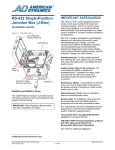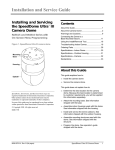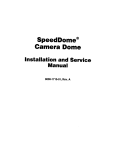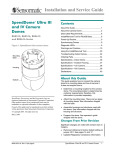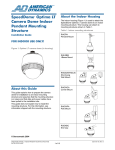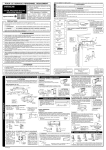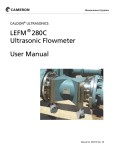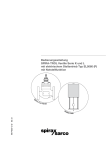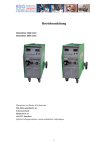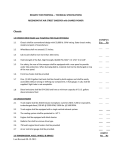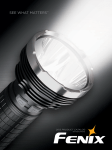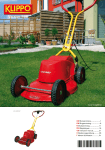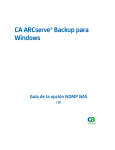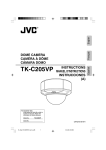Download American Dynamics RJ1SNUD-1 Installation guide
Transcript
IMPORTANT SAFEGUARDS SensorNet Single-Position Junction Box (J-Box) The J-Box is a 10A, 2-pole, ganged disconnect device, which also provides short circuit and overload protection, and has a minimum 3mm open circuit clearance, in accordance with the National Electric Code and applicable local codes must be installed at a location readily accessible to the equipment. Installation Guide (Ein 10A, 2-poliges, gekoppeltes Ausschaltgerät, welches auch über einen Kurzschluß- sowie Überbelastungsschutz verfügt, und einen minimum 3mm offenen Schaltabstand aufweist, nach Übereinstimmung mit den Nationalen Elektrischen Regelungen sowie lokalen Regeln, muß an einem Standort installiert werden, welcher einfachen Zugang zum Gerät erlaubt.) Figure 1. SensorNet J-Box Cover Retaining Screws, Plastic (4) On/Off Switch Outside elements: To keep outside elements from entering the J-Box, always mount it vertically with cable exits facing down, and tighten the four plastic screws. Adding access holes to the enclosure: The J-Box meets the NEMA 4 standard for weatherproofing. To maintain this rating, make sure any hole you drill in the enclosure is thoroughly sealed with silicone-based RTV compound. Spare Fuses (2) Access for Cables from Host and Dome Switching to 240Vac: If using 240Vac to drive the J-Box, you must change jumper terminations on the primary winding of transformer. Refer to label inside cover of J-Box. Latches (2) Approved power cords: Use only regulatoryapproved polarized power cords. RJ1SNUD and RJ1SNUD-1 Series Socket-outlet: For installation using a line cord, the socket-outlet must be installed near the equipment and at an easily accessible location. This weather-tight box (Figure 1) provides Class 2 LPS power and data to the new SpeedDome Ultra outdoor camera housing. (Für Installationen mit einem Stromkabel muß die Steckdose an einem Standort installiert werden, welcher einfachen Zugang erlaubt.) IMPORTANT: Read Regulatory Requirements and other declarations on page 8. This product does not support Manchester protocol: It will support SensorNet. USE ONLY WITH American Dynamics products and other approved products from Sensormatic Electronics Corporation. See inside for additional safeguards. © 2006 Sensormatic Electronics Corp. SENSORNET SINGLE-POSITION JUNCTION BOX (J-BOX) INSTALLATION GUIDE 8000-2573-21, REV. F 1 of 10 SensorNet Communication Interface SensorNet Single-Position J-Box Specifications Cable distance: J-Box to J-Box..................... 1km (3000ft) REG ID: SV JBOX1 Host to J-Box ...................... 1km (3000ft) J-Box to camera dome ........ Limited by the length of the low-voltage ac power cable. See Table 1 on page 6. Product Codes RJ1SNUD .............................120V with North American line cord Cable type ................................ 1unshielded twisted pair, 22AWG, non-polarized RJ1SNUD-1 ..........................230V with Continental European line cord Transformer primary jumpers and mains line cord are field changeable to support either 120Vac or 230Vac Surge protection....................... Isolation transformer coupled, 2000 Vrms, gas discharge tube impulse rated at 10kA, 8/20µs, TVS rated at 1W. Electrical Power source ........................100–120Vac or 200–240Vac, 50/60Hz Connectors for host, aux., and dome ........................ Pluggable Euro-style Fuse......................................3.15A type IEC127, sheet III Environmental Max. operational limits ..........90–135Vac or 180–265Vac, 50/60Hz Weatherproof standard ............ NEMA 4 / IP66 Input current..........................1.0A/.5A Operating temperature ............. –40°C to 50°C (–40°F to 122°F) Output ...................................26Vac, 2.4A max. Class 2 LPS Storage temperature ................ –10°C to 50°C (14°F to 122°F) Power line protection ............Gas Discharge tube impulse rated at 8/20µs impulse discharge current: 10kA Relative humidity...................... 0 to 95% non-condensing Regulatory Operational EMC ......................................... 47 CFR, Part 15, Class A EN55022, Class B Diagnostic LEDs ...................Host, aux., dome activity, noise, power Immunity................................... EN50082-1 Safety....................................... UL1950 CSA 22.2, No. 950 EN60950 Power....................................On/Off switch Compatible with ....................SpeedDome Ultra outdoor housing See additional declarations on last page. Mechanical Environment..........................Indoor / Outdoor Wall mounting options...........concrete, wood, sheet rock Dimensions (H x W x D)........200 x 200 x 132mm (7.87 x 7.87 x 5.19 in.) Mounting area (H x W)..........281 x 200mm (11 x 8 in.) Weight:..................................3.7 kg (8.25 lbs) Construction..........................Polycarbonate, nonmetallic enclosure Color .....................................Light gray Cover locks ...........................2 quick-release latches Cable access ........................3 ½-inch NPT strain relief fittings provided for power, host, and dome cables. SENSORNET SINGLE-POSITION JUNCTION BOX (J-BOX) INSTALLATION GUIDE 8000-2573-21, REV. F 2 of 10 Mounting the J-Box Figure 2. Wall-mounting the J-Box This section explains how to mount the J-Box to a wall or pole. 200mm (7.9") Parts Required 114.3mm (4.5") Installation Kit (0351-1646-01) includes: Screw, Self-tapping, 4.8x25, PHP Anchor Bolt, ¼-20x2¼, w/Hardware Anchor, Toggle, Nylon, #8-#10 Screw 4 4 4 5810-5081-111 2880-0011 2880-0073-01 76.2mm (3.0") 152.4mm (6.0") CAUTION: Before you begin, do the following: − Mount the box near an accessible ac outlet. 255mm (10") − Always use dedicated, unswitched, and properly grounded 24-hour ac power. Power should be supplied in accordance with local codes. − Mount the J-Box so its power on/off switch is readily accessible and its strain relief fittings are face down. Indoor Wall Mounting Mount the J-Box to the wall as follows (Figure 2): 1. Using the upper and lower mounting brackets of the box as templates, mark mounting hole locations. The two center top slots in the upper bracket match the bolt spacing used for older J-Boxes. CAUTION: J-Box meets NEMA 4 standard for weatherproofing. To maintain this rating, ensure holes drilled in the enclosure are thoroughly sealed with silicone-based RTV compound. All outdoor wiring must be through conduit, and tighten the four plastic screws. 2. Install the J-Box to drywall, concrete, or wood (see note below). • Drywall: Use four self-tapping screws and Nylon anchors provided. • Concrete: Use four anchor bolts provided. Use a 6.3mm (1/4in) masonry bit (not provided) to drill screw holes. • Wood: Use four self-tapping screws. Note: To facilitate installation, use the two open slots in the lower mounting bracket to rest the box on the screws while inserting screws through the upper bracket. 3. Tighten mounting hardware to secure the J-Box. SENSORNET SINGLE-POSITION JUNCTION BOX (J-BOX) INSTALLATION GUIDE 8000-2573-21, REV. F 3 of 10 b. Using your fingers, flatten the last 2.54cm (1in) of band inward to form a hook. Insert hook through remaining slot in rack and turn screw to secure J-Box to pole (Figure 4e). Outdoor Pole Mounting Outdoor mounting (Figure 3) requires that PC board, chassis, and power cord be removed to facilitate attachment to pole. PC board and chassis are reattached once box is secured. 5. Run cables and attach wires. See “Connecting AC Power” and “Connecting Power and Data Cables”. Caution: Do not use power cord supplied with box for outdoor installations. Note: Pole Mount Kit RHOPM, supplied with the pole mount structure, includes straps sufficient for 10–30.5cm (4–12in) wide poles. For larger widths, order an additional kit. Figure 4. Pole-mount—details Figure 3. Outdoor pole mount a. Straps P/N: 6010-0043-01 Remove PC board assembly. Remove chassis assembly. Rear of J-Box Discard power cord. 1. On the ground: a. Remove PC board assembly and chassis assembly from box (Figure 4a). b. Remove power cord and attach conduit to box. Ensure connections are liquid-tight. c. Remove racks, screw assemblies, and band from clamp package. Carefully uncoil band and cut it in half to form two bands. d. With words “this side up” etched in rack facing up, insert rack into screw assembly (Figure 4b). Then turn screw just enough to engage rack. Prepare two racks this way. b. c. Band 2 Rear of Box 2. As shown in Figure 4c, with J-Box on ground and its rear facing towards you: a. Slip one of the two bands through closed slots in lower mounting bracket. Pick slots appropriate for the width of the pole. b. Bend end of left side of band inward. c. Slip bent end through large slot in screw assembly and flatten tight with fingers. d. Repeat for upper mounting bracket. Band 1 d. Cut e. 3. Place box in its mounting location against pole. Then wrap both band assemblies around pole so screws are opposite J-Box. 4. Holding J-Box in place, perform the following for each band: a. Cut band to length at a point 2.54cm (1in) beyond first notch in band (Figure 4d). SENSORNET SINGLE-POSITION JUNCTION BOX (J-BOX) INSTALLATION GUIDE 8000-2573-21, REV. F 4 of 10 3. Disconnect ac power cord from TB1 (Figure 6). Connecting AC Power 4. Loosen four screws to detach chassis. The J-Box comes wired for 120Vac and has a 2m (6ft 7in) SJT 3-conductor power cord attached. Plug the cord into a dedicated 24-hour, unswitched outlet. 5. Detach strain relief securing cord and remove cord (refer to Figure 12). Figure 6. Transformer compartment detail If the box is to be driven by 240Vac, then the power cord (if used) and jumpers across the primary winding of the transformer within the box will have to be changed (Figure 6). Chassis Screws (4) CAUTION: Use only regulatory-approved polarized power cords. Hardwiring the J-Box TB1 If the box is to be hardwired to the ac source, then the chassis within the box and the power cord will have to be removed to facilitate connection. Refer to Figures 5, 6, and 13 for how to remove these parts. CAUTION: Keep the disconnect device (circuit breaker) readily accessible when hardwiring J-Box. Do the following: 24V 1. Unplug line cord from ac outlet. 12V Power On/Off Switch Transformer 1 2 0V Red TB1 L1 N / L2 Blk 120V GND 2. Loosen two screws, then slide and lift PC board assembly to remove and access ac connections (Figure 5). 0V 3 GND 4 0V 120V Red Transformer Primary Jumper Settings 120Vac 1-3, 2-4 Figure 5. Accessing connections 240Vac 2-3 Loosen screws, then slide and lift PC board assembly to remove. SENSORNET SINGLE-POSITION JUNCTION BOX (J-BOX) INSTALLATION GUIDE Blk Chassis Connections AC Line Connections Color Pin Function Pin Function Green/ Yellow E1 Ground E1 Ground Black 2 Neutral (N / L2) 2 Neutral (N / L2) Black 3 Line (L1) 3 Line (L1) 8000-2573-21, REV. F 5 of 10 6. Run conduit and ac cable to box and clamp conduit in place (Figure 7). Connecting Power and Data Cables 7. Reattach chassis. Note: Incoming and outgoing video cables are connected together within the box. No termination exists for video cables within the J-Box. Figure 7. Conduit attachment Power Cable Requirements The low-voltage power cable runs between the J-Box and the camera dome. The length of this cable depends on the ac line voltage. See Table 1 for cable lengths based on worst case low line voltages for Japan (100Vac), North America (120vac), and Europe (240vac). Table 1. Cable length vs. line voltage Fuse holders Worst Case Line Voltages Conduit 8. Wire ac line to TB1 and jumper primary taps of transformer according to ac source (refer back to Figure 6). 120Vac: Place a jumper across taps 1 and 3, and another jumper across taps 2 and 4. 240Vac: Place a jumper across taps 2 and 3 only. 18AWG 16AWG 14AWG 90 Vac (Japan) 30m (100ft) 50m (160ft) 80m (260ft) 102 Vac (N. Amer.) 60m (200ft) 100m (320ft) 160m (520ft) 180 Vac (Europe) 30m (100ft) 50m (160ft) 80m (260ft) 204 Vac (Europe) 60m (200ft) 100m (320ft) 160m (520ft) Data Cable Requirements 9. Reattach PC board assembly. To reduce the risk of fire, replace fuses with the same type and rating (3:15A type IEC127, sheet III). The part number for the fuse is 5111-0017-21. Two spare fuses are provided inside the cover. The data cable contains one non-polarized 22AWG, unshielded, twisted pair. Up to 1km (3000ft) of data cable can be run from the Host to the J-Box, or from J-Box to J-Box (see CAUTION below). For more information about the SensorNet communication protocol and possible cable network configurations, see Communication Protocols and Cable Networks, 8000-2573-19. To access fuse, use a small slotted screwdriver to unscrew the cap of the fuse holder (Figure 7) and lift out the fuse. CAUTION: The data cable from the J-Box to the dome is limited by the length of the power cable. See Table 1 above. Changing the Fuse Note: Power, data, and video cables can be ordered separately or within a composite cable ordered in various lengths. Plenum-rated cables must be used in indoor ceilings used for environmental air return (called “other air space” in the National Electrical Code). Order parts through your distribution network. If you order cable from an outside source, wire colors may be different. SENSORNET SINGLE-POSITION JUNCTION BOX (J-BOX) INSTALLATION GUIDE 8000-2573-21, REV. F 6 of 10 Referring to Figure 8: P1 AUX JW4 JW1 1 1-2 Terminated* 2-3 Unterminated (*Default setting) JW2 BRN BLK RED WHT YEL HOST SNet – AC – Gnd – AC – SNet – SensorNet PCB 1 2. Route power and data cables through strain relief fittings in bottom of box. 1 1 1. Turn power switch in J-Box to off (0). Power LED should be off. DOME 123 Figure 8. PCB connectors and jumpers Procedure P7 3. Connect power and data cables to 5-pin compression connector (supplied on board). Color code shown is for composite cable. Power and Data Description 1 2 3 4 5 YEL WHT RED BLK BRN SensorNet AC Ground AC SensorNet 1 Host and Aux Data AUX HOST 456 123 FALSE CD 5-Pin Compression Connector Wire Color Aux Aux Host Host 1 AC PWR +5Vdc Pin P8 Testing for Power and Data LEDs on the circuit board (Figure 8) verify that power and data are entering the J-Box. 4. Plug 5-pin connector into receptacle P1. LED Indication 5. Connect auxiliary and host data cables to 4-pin compression connector P8 (supplied on board). Color code shown is for composite cable. AC PWR Glows yellow to indicate 24 volt AC power from transformer. +5Vdc Glows green to indicate DC power from on-board regulator. False CD Glows red for 1/2 sec. to indicate spurious false carrier detects.* Carrier Detect 123 Glows yellow to indicate communications from connector P1 to dome.* 4-Pin Compression Connector Pin Wire Color Description 1 2 3 4 YEL BRN YEL BRN Host Host Aux. Aux. (Carrier Detect 456 is not used.) 6. Plug 4-pin connector into receptacle P8. 7. Place jumper JW1 (Dome) across pins 1–2 to terminate J-Box (default setting) when the J-Box is to be the end point of a data line. Place JW1 across pins 2-3 (unterminated) if the J-Box is to be the hub of a star network. * For jumpers JW2 and JW3: See Communications Protocols and Cable Networks, 8000-2573-19. SENSORNET SINGLE-POSITION JUNCTION BOX (J-BOX) INSTALLATION GUIDE Carrier Detect Aux. Glows yellow to indicate communications from auxiliary device.* Carrier Detect Host Glows yellow to indicate communications from Host.* Retriggerable indicators remain on if triggered faster than the remaining time. 8000-2573-21, REV. F 7 of 10 Troubleshooting Removing the Transformer Problem Possible Solution No Power First check both fuses, then look for open or loose wire connections at TB1. If loose, reconnect wires. Measure voltage across 0 and 24V taps of secondary winding on transformer. If open, replace transformer. See “Removing the Transformer” opposite. Follow steps to remove the transformer. Reverse steps to reassemble. No Data 1. Loosen four captive screws to release cover. 2. As shown in Figure 10, loosen two screws shown in and slide chassis in direction of arrows. Gently lay chassis on inside front cover while working on transformer. Slide PCB chassis out of box. Figure 10. Check for loose wires. If OK, see “Testing for Power and Data” on page 7. Removing the Circuit Board Follow steps to remove the circuit board. Reverse steps to reassemble. Screws (2) 1. Loosen four captive screws to release cover. 2. Remove six screws to remove circuit board (Figure 9). 3. Remove four nuts to remove transformer (Figure 11). Figure 9. Figure 11. Screws (6) Screws (6) SENSORNET SINGLE-POSITION JUNCTION BOX (J-BOX) INSTALLATION GUIDE Nuts (4) 8000-2573-21, REV. F 8 of 10 Ordering Parts Only the following parts can be ordered: • • • • • • SensorNet PC Board 0312-0512-02 5-Pin Connector 2109-0254-04 4-Pin Connector 2109-0254-03 Power Transformer 5604-0205-01 Cable Strain Relief 3100-0035-11 Fuse 5111-0017-21. These parts are shown bold in Figure 12. Circuit Board, 0312-0512-02 5-Pin Connector, 2109-0254-04 Figure 12. Exploded view of SensorNet J-Box 4-Pin Connector, 2109-0254-03 Circuit Board Assy. On/Off Switch Labels Chassis Fuses, 5111-0017-21 Transformer, 5604-0205-01 Strain Relief (3), 3100-0035-11 SENSORNET SINGLE-POSITION JUNCTION BOX (J-BOX) INSTALLATION GUIDE 8000-2573-21, REV. F 9 of 10 Declarations This product can only be used with American Dynamics products and other approved products from Sensormatic Electronics Corporation. When the unit is hard wired, the disconnect device (circuit breaker) must be readily accessible. To meet regulatory approvals, only use approved polarized plug/cordsets. Install the AC outlet near the equipment where it is easily accessible. FCC COMPLIANCE: This equipment has been tested and found to comply with the limits for a Class A digital device, pursuant to Part 15 of the FCC Rules. These limits are designed to provide reasonable protection against harmful interference when the equipment is operated in a commercial environment. This equipment generates, uses, and can radiate radio frequency energy and, if not installed and used in accordance with the instruction manual, may cause harmful interference to radio communications. Operation of this equipment in a residential area is likely to cause harmful interference in which case the user will be required to correct the interference at his own expense. EQUIPMENT MODIFICATION CAUTION: Equipment changes or modifications not expressly approved by Sensormatic Electronics Corporation, the party responsible for FCC compliance, could void the user's authority to operate the equipment and could create a hazardous condition. WARRANTY DISCLAIMER: Sensormatic Electronics Corporation makes no representation or warranty with respect to the contents hereof and specifically disclaims any implied warranties of merchantability or fitness for any particular purpose. Further, Sensormatic Electronics Corporation reserves the right to revise this publication and make changes from time to time in the content hereof without obligation of Sensormatic Electronics Corporation to notify any person of such revision or changes. LIMITED RIGHTS NOTICE: For units of the Department of Defense, all documentation and manuals were developed at private expense and no part of it was developed using Government Funds. The restrictions governing the use and disclosure of technical data marked with this legend are set forth in the definition of "limited rights" in paragraph (a) (15) of the clause of DFARS 252.227.7013. Unpublished - rights reserved under the Copyright Laws of the United States. COPYRIGHT NOTICE: SpeedDome and American Dynamics are registered trademarks of Sensormatic Electronics Corporation. Other product names (if any) mentioned herein may be trademarks or registered trademarks of Sensormatic or other companies. No part of this guide may be reproduced in any form without written permission from Sensormatic Electronics Corporation. RLJ/CSD 04/2006 www.americandynamics.net SENSORNET SINGLE-POSITION JUNCTION BOX (J-BOX) INSTALLATION GUIDE 8000-2573-21, REV. F 10 of 10










